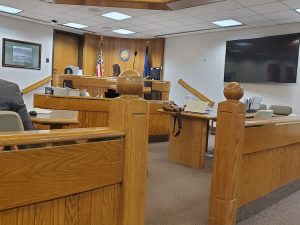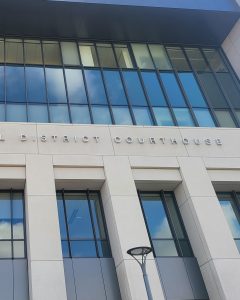



First off, you can be thrown in jail for failure to obey a court order. That normally doesn’t happen at the first order to show cause, but it can. Orders to show cause are court hearings were one party or the judge commands your courtroom presence and requires you to explain your actions, or non-actions. And why you allegedly violated the court order.
Orders to show cause are court hearings were one party or the judge commands your courtroom presence and requires you to explain your actions, or non-actions. And why you allegedly violated the court order.
The basics of an order to show cause issued by a judge is that you failed to comply with a judicial order. That order may be failing to attend jury duty, or in the Utah criminal context, failure to comply with a probation or bail condition.
Judicial orders come in many forms, but here are some common judicial orders people fail to comply with:
(1). Failure to pay criminal fines. (2). Failure to obtain a substance abuse evaluation or timely obtain one. (3). Failure to file proof with the court, or update your address. (4). Failure to pay child support. (5). Failure to perform community service. (6). Failure to stay crime free during probation. (7). Committing a crime or infraction during probation. (8). Getting new charges during probation, even though no conviction has rendered. (9). And many more.
Utah orders to show cause can be in civil and criminal cases.
Who Can Bring an Order to Show Cause? 
Judge’s sue sponte: Never a good day when the judge on their own initiative brings an order to show cause why you screwed up probation. That means the judge is mad enough, even with their busy docket, to summon you back to court to explain your conduct.
Prosecuting attorney: The prosecuting attorney is generally monitoring your compliance with probationary terms in your Utah criminal case. Normally when you are charged or convicted of a new crime, the prosecutor will bring order to show cause.
Victim: The criminal victim after you plead or are found guilty can bring an order to show cause as to why you have not paid criminal restitution.
There are four filings to an order to show cause in most criminal courts.
(1). Motion. The motion for an order to show cause detailing why the person failed to comply with a court order. Issued by the court clerk (on behalf of the judge), the prosecutor or the victim. Sometimes Adult Probation & Parole will file a declaration with the court of your non-compliance triggering a hearing.
(2). Aff/Declaration. The affidavit or declaration signed upon personal knowledge that the person failed to comply with a court order.
(3). Order. The judicial order to show cause signed by the judge commanding that you appear in court and explain your behavior.
(4). Notice to Submit. The notice to submit for decision where you formally ask the judge to sign the order to show cause. It is a non-substantive document.
There is a distinct process when you are facing an order to show cause in your Utah criminal matter. It is the same in a Utah criminal justice court or criminal district court matter.
First: Motion for Order to Show Cause Filed. The order to show cause is filed against you. Motion, declaration or affidavit.
Second: Admit or Deny Allegations. You attend your first court hearing. You either admit some or all of the orders to show cause allegations, or you deny them all.
Third: Evidentiary Hearing. If you deny all or some of the allegations, these contested allegations are set for an evidentiary hearing or oral argument. Evidentiary hearings can be one hour or more and the state must prove their allegations by a preponderance of the evidence that your violated your probation, or failed to comply with a court order. You don’t have to be convicted of new charges to be found responsible for the allegations. But, most courts wait until the new charges are adjudicated.
Fourth: Sanction. If you admit some of the allegations, then you immediately move to the sanctions phase of the hearing, or come back at another time to determine what sanctions are appropriate for the admitted failures to follow court orders.
 Graduated Sanctions. Most judges don’t throw you in jail for a first order to show cause violation. It can happen, especially when you get new criminal charges while you are on probation. Here are some common sanctions in order of first to last use.
Graduated Sanctions. Most judges don’t throw you in jail for a first order to show cause violation. It can happen, especially when you get new criminal charges while you are on probation. Here are some common sanctions in order of first to last use.
(1). Revoke and reinstate. The standard is to revoke and reinstate probation for another 12 months.
This is the first measure the court will take as a sanction.
(2). Community Service. Instead of jail, community service is ordered. Likely you already had
community service ordered as part of your original probation sentence. More community service can be
ordered. 40 hours of community service is not uncommon.
(3). Fines. You can be ordered to pay more fines. Another $250 or $500. Additional fine payments are
not popular with judges as people don’t have the ability to pay.
(4). Revoke your Plea in Abeyance. The worst sanction in an order to show cause is to have your plea in
abeyance revoked and a conviction enter against you. Then your entire sentence can start all over again,
rather than just closing the case.
(5). Jail. Normally jail is the last option in graduated sanctions available to the judge. If jail is ordered, it
can be the full term of the sentence or a few days. Normally a few days on the weekends are ordered.
Hiring a knowledgeable Utah criminal defense attorney who really works regularly in front of that judge
is a really good start. Knowing the judge’s tendencies and how he handles common situations is critical
and worth the money you spend.
(1). Ask for an Extension. File a motion for an extension of time to perform the probation terms. If your substance abuse evaluation is due within 3 months and you are late, have your attorney file a motion for an extension of time. Don’t wait for the order to show to issue.
(2). Comply. If the OSC has already been filed, you should strive to get what they are asking for done. This means put on the fast track getting your late evaluation done, or paying that fine. Movement towards fixing what the order to show cause is complaining about goes a long ways with the court and prosecutor.
(3). Preempt the Court. It is better that your file a motion for a review hearing to address your probation screw-ups, then let the court or prosecutor discovery them first. It is always better to bring to the attention of the court your non-compliance with a motion for a review hearing and pre-empt the prosecutor’s rage.